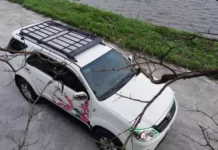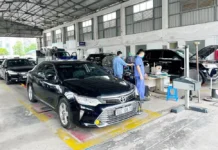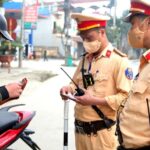From 2025, professional drivers of transport vehicles and cars with a capacity of eight or more passengers will not be allowed to drive for more than ten hours a day or forty-eight hours a week.
This regulation is outlined in Circular No. 71/2024/TT-BCA issued by the Minister of Public Security, which provides guidelines for the management, operation, and utilization of the data management system for in-vehicle monitoring devices and driver image recording equipment.
Specifically, Article 13 of the Circular stipulates the responsibilities of drivers of transport vehicles and cars with a capacity of eight or more passengers (excluding the driver’s seat) engaged in transportation, as well as tow trucks, ambulances, and rescue vehicles, as follows:
Be accountable for managing in-vehicle monitoring devices and driver image recording equipment during their assigned driving shifts.
Comply with driving time regulations as stipulated in Clause 1, Article 64 of the Law on Road Traffic Order and Safety, specifically: Professional drivers of cars must not drive for more than ten hours a day or forty-eight hours a week, and they should not drive continuously for more than four hours. These regulations are in accordance with the relevant provisions of the Labor Code.
Promptly notify the transport business units or vehicle owners if the in-vehicle monitoring devices or driver image recording equipment malfunctions or loses connection.
Additionally, Circular 71/2024 outlines the responsibilities of transport business units and owners of vehicles with a capacity of eight or more passengers (excluding the driver’s seat) engaged in transportation, tow trucks, ambulances, and rescue vehicles, as follows:
Manage vehicles, install, and monitor in-vehicle devices, and ensure driver image recording equipment complies with the national technical regulations. Transmit accurate, complete, and continuous data as specified in Clause 1, Article 6 of this Circular to the server of the Traffic Police Department.
Ensure objectivity, accuracy, and timeliness in data provision, without altering or distorting the data transmitted to the server of the Traffic Police Department. Maintain data security and confidentiality.
Alert drivers when the in-vehicle monitoring devices or driver image recording equipment fails to transmit data to the service server.
Systematically update and store data on the road itineraries of vehicles and driver images for a minimum period of one year for data collected from in-vehicle monitoring devices and three months for data collected from driver image recording equipment.
Transport business units or vehicle owners may directly perform the tasks stipulated in this Article or engage the services of a service provider to do so.
Service providers are responsible for ensuring that the supplied equipment complies with the national technical regulations for in-vehicle monitoring devices and driver image recording equipment.
Ensure objectivity, accuracy, and timeliness in data provision, without altering or distorting the data transmitted to the server of the Traffic Police Department.
Alert transport business units, vehicle owners, and drivers when the in-vehicle monitoring devices or driver image recording equipment fails to transmit data to the service server.
Systematically update and store data on the road itineraries of vehicles and driver images for a minimum period of one year for data collected from in-vehicle monitoring devices and three months for data collected from driver image recording equipment.
TH (Tuoitrethudo)
Image source: CA
A Proposal to Implement Severe Penalties for Reckless Drivers: The Case of Wrong-Way Drivers on Highways
Driving in reverse or against the flow of traffic on a highway is an extremely dangerous act that can lead to catastrophic consequences. Such behavior not only demonstrates a blatant disregard for one’s own life but also puts the lives of other road users at immense risk. This reckless action has the potential to cause devastating chain-reaction collisions, impacting numerous individuals and leaving a trail of destruction in its wake.
Honda Vietnam Concludes the Helmet Granting Ceremony for Nationwide First Graders in the 2023–2024 School Year
Recently, Honda Vietnam has summarized the efficiency of the helmet donation program for first-graders in combination with training in road safety knowledge for students and parents nationwide in the 2023 – 2024 academic year. The program was implemented by Honda Vietnam Company (HVN) in coordination with the National Traffic Safety Committee (NTSC), the Ministry of Education and Training.














































